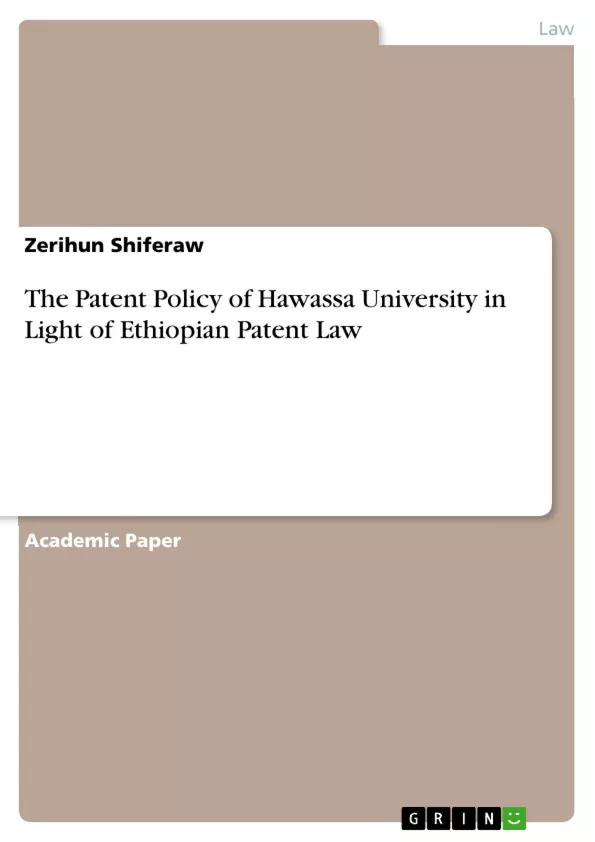A patent is a monopoly right granted by the government through the patent office to an individual who has invented a product or process. The basic objectives for granting this right are to inform the public through the publication of details from the application of the latest technological advances; to provide an incentive for innovation and thereby stimulate economic activity; and to provide a reward for creative and innovative effort.
Universities move their knowledge and discoveries to the general public in different ways, and one is relationships with industry. The inventions discovered by the researchers at the universities may be patented and licensed to the industry and the proceeds of it may be used for further research to solve the problems of the public. This necessitates universities to hold patent policy and guidelines thus; this research assessed the necessity of the patent policy of Hawassa University in light of Ethiopian patent law. It basically used a qualitative research method and assured the non-existence of an authoritative patent policy for the university, recommending the necessity of such an authoritative patent policy due to sound rationals to do so.
The research also forwarded the policy directions to demarcate the relationship between the university and an inventor and that of industries as to the scope of the policy, ownership of the patent, procedure of patents, manner of funding the research, and the mechanism of sharing royalties. As it covered these essential points, the research may be used as a basic tool to have a well-developed patent policy for the university and for the furtherance of the research in the area.
Inhaltsverzeichnis (Table of Contents)
- Acknowledgement
- Abstract
- Introduction
- Chapter One
- Background of the research
- Statement of problem
- Literature Review
- Objective of the Research
- Research Questions
- Methodology
- Significance of the Study
- Chapter Two
- General Aspects of Patents
- Definition of Patents
- The concept and development of patents
- Conditions of patentability
- Non patentable subject matters
- Relation between law and policy
- Nexus between patent and copyrights
- Chapter Three
- Patent policy in Universities
- Why patent policies in universities?
- Principles that govern inventions in universities
- Experiences from different universities
- The Rationales for Hawassa University Patent Policy
- The position to be taken to the patent policy of Hawassa University
- Chapter Four
- Conclusion and Recommendations
- Conclusion
- Recommendations
- References
Zielsetzung und Themenschwerpunkte (Objectives and Key Themes)
This research examines the necessity of a patent policy for Hawassa University in light of Ethiopian patent law. It aims to assess the existing situation, identify the rationale for a patent policy, and recommend directions for its development. The study utilizes a qualitative research approach to explore the need for an authoritative patent policy, focusing on the university's relationship with inventors and industries.
- The necessity of a patent policy for Hawassa University
- The rationale for a patent policy within the context of Ethiopian patent law
- The relationship between universities, inventors, and industries regarding patent ownership and procedures
- The role of funding and revenue sharing in patent policy
- The development of a comprehensive patent policy for Hawassa University
Zusammenfassung der Kapitel (Chapter Summaries)
Chapter one provides the background of the research, outlining the problem statement, literature review, research objectives, research questions, methodology, and significance of the study. Chapter two delves into general aspects of patents, defining the concept, its development, conditions of patentability, non-patentable subject matters, the relation between law and policy, and the nexus between patent and copyrights. Chapter three specifically focuses on patent policies in universities, exploring their rationale, the principles governing inventions, experiences from different universities, and the rationales for a patent policy at Hawassa University. It also examines the legal framework, including the National Science, Technology, and Innovation Policy, the Higher Education Proclamation, and the University's mission, vision, and Ethiopian patent law.
Schlüsselwörter (Keywords)
The main keywords and focus topics of this research include patent policy, university, invention, innovation, Ethiopian patent law, Hawassa University, research, technology transfer, industry relations, funding, and revenue sharing.
- Quote paper
- Zerihun Shiferaw (Author), 2015, The Patent Policy of Hawassa University in Light of Ethiopian Patent Law, Munich, GRIN Verlag, https://www.hausarbeiten.de/document/1277703


